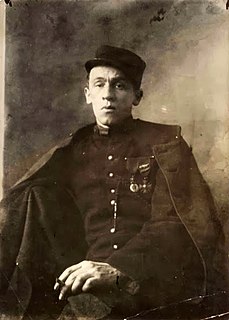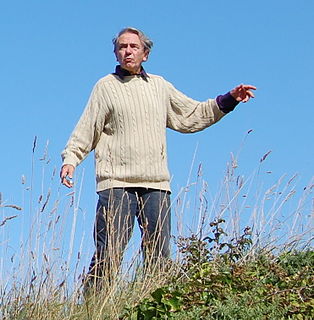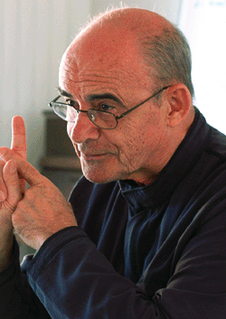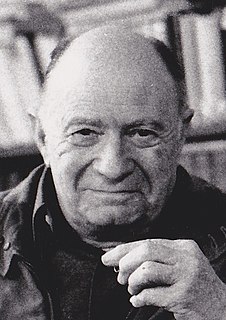
André Paul Guillaume Gide was a French author and winner of the Nobel Prize in Literature. Gide's career ranged from its beginnings in the symbolist movement, to the advent of anticolonialism between the two World Wars. The author of more than fifty books, at the time of his death his obituary in The New York Times described him as "France's greatest contemporary man of letters" and "judged the greatest French writer of this century by the literary cognoscenti."

Cogito, ergo sum is a Latin philosophical proposition by René Descartes usually translated into English as "I think, therefore I am". The phrase originally appeared in French as je pense, donc je suis in his Discourse on the Method, so as to reach a wider audience than Latin would have allowed. It appeared in Latin in his later Principles of Philosophy. As Descartes explained, "we cannot doubt of our existence while we doubt...." A fuller version, articulated by Antoine Léonard Thomas, aptly captures Descartes's intent: dubito, ergo cogito, ergo sum. The concept is also sometimes known as the cogito.

Marie-Henri Beyle, better known by his pen name Stendhal, was a 19th-century French writer. Best known for the novels Le Rouge et le Noir and La Chartreuse de Parme, he is highly regarded for the acute analysis of his characters' psychology and considered one of the earliest and foremost practitioners of realism.
The term suspension of disbelief or willing suspension of disbelief has been defined as a willingness to suspend one's critical faculties and believe something surreal; sacrifice of realism and logic for the sake of enjoyment. The term was coined in 1817 by the poet and aesthetic philosopher Samuel Taylor Coleridge, who suggested that if a writer could infuse a "human interest and a semblance of truth" into a fantastic tale, the reader would suspend judgement concerning the implausibility of the narrative. Suspension of disbelief often applies to fictional works of the action, comedy, fantasy, and horror genres. Cognitive estrangement in fiction involves using a person's ignorance to promote suspension of disbelief.

Frédéric-Louis Sauser, better known as Blaise Cendrars, was a Swiss-born novelist and poet who became a naturalized French citizen in 1916. He was a writer of considerable influence in the European modernist movement.

Victor Cousin was a French philosopher. He was the founder of "eclecticism", a briefly influential school of French philosophy that combined elements of German idealism and Scottish Common Sense Realism. As the administrator of public instruction for over a decade, Cousin also had an important influence on French educational policy.

Jacques Rancière is a French philosopher, Professor of Philosophy at European Graduate School in Saas-Fee and former Professor of Philosophy at the University of Paris VIII: Vincennes—Saint-Denis who came to prominence when he co-authored Reading Capital (1968), with the structuralist Marxist philosopher Louis Althusser.

Meditations on First Philosophy in which the existence of God and the immortality of the soul are demonstrated is a philosophical treatise by René Descartes first published in Latin in 1641. The French translation was published in 1647 as Méditations Métaphysiques. The title may contain a misreading by the printer, mistaking animae immortalitas for animae immaterialitas, as suspected by A. Baillet.

Jean-Luc Nancy is a French philosopher. Nancy's first book, published in 1973, was Le titre de la lettre, a reading of the work of French psychoanalyst Jacques Lacan, written in collaboration with Philippe Lacoue-Labarthe. Nancy is the author of works on many thinkers, including La remarque spéculative in 1973 on Georg Wilhelm Friedrich Hegel, Le Discours de la syncope (1976) and L’Impératif catégorique (1983) on Immanuel Kant, Ego sum (1979) on René Descartes, and Le Partage des voix (1982) on Martin Heidegger. In addition to Le titre de la lettre, Nancy collaborated with Lacoue-Labarthe on several other books and articles. Major influences include Martin Heidegger, Jacques Derrida, Georges Bataille, Maurice Blanchot and Friedrich Nietzsche.

Jacques Ellul was a French philosopher, sociologist, lay theologian, and professor who was a noted Christian anarchist. Ellul was a longtime Professor of History and the Sociology of Institutions on the Faculty of Law and Economic Sciences at the University of Bordeaux. A prolific writer, he authored 58 books and more than a thousand articles over his lifetime, many of which discussed propaganda, the impact of technology on society, and the interaction between religion and politics. The dominant theme of his work proved to be the threat to human freedom and religion created by modern technology. Among his most influential books are The Technological Society and Propaganda: The Formation of Men's Attitudes.

Lev Isaakovich Shestov, born Yeguda Leib Shvartsman, was a Russian existentialist philosopher, known for his "philosophy of despair". Born in Kiev on February 12 [O.S. January 31] 1866, he emigrated to France in 1921, fleeing from the aftermath of the October Revolution. He lived in Paris until his death on November 19, 1938.
Kostas Axelos was a Greek-French philosopher.
Paul-Louis Couchoud, was born on July 6, 1879, at Vienne, Isère and died there on April 8, 1959. He was a French philosopher, a graduate from the prestigious École Normale Supérieure in Paris, a physician, a man of letters, and a poet. He became well known as an adapter of Japanese haiku into French, an editor of Reviews, a translator, and a writer promoting the German thesis of the non-historicity of Jesus Christ.
John Brockman is a literary agent and author specializing in scientific literature. He founded the Edge Foundation, an organization aimed to bring together people working at the edge of a broad range of scientific and technical fields.

The Philosophy of Freedom is the fundamental philosophical work of the philosopher and esotericist Rudolf Steiner (1861–1925). It addresses the questions whether and in what sense human beings can be said to be free. Originally published in 1894 in German as Die Philosophie der Freiheit, with a second edition published in 1918, the work has appeared under a number of English titles, including The Philosophy of Spiritual Activity, The Philosophy of Freedom, and Intuitive Thinking as a Spiritual Path.

Thinking outside the box is a metaphor that means to think differently, unconventionally, or from a new perspective. This phrase often refers to novel or creative thinking. The term is thought to derive from management consultants in the 1970s and 1980s challenging their clients to solve the "nine dots" puzzle, whose solution requires some lateral thinking. This phrase can also be found commonly in dance, as encouragement to move creatively, beyond simple, geometric box steps and their basic variations, to literally step outside the box into more complex patterns of expression.

Socratic questioning was named after Socrates, who was a philosopher in c. 470 BCE–c. 399 BCE. Socrates utilized an educational method that focused on discovering answers by asking questions from his students. Socrates believed that "the disciplined practice of thoughtful questioning enables the scholar/student to examine ideas and be able to determine the validity of those ideas". Plato, a student of Socrates, described this rigorous method of teaching to explain that the teacher assumes an ignorant mindset in order to compel the student to assume the highest level of knowledge. Thus, a student has the ability to acknowledge contradictions, recreate inaccurate or unfinished ideas and critically determine necessary thought.

Laurence Caruana is a Maltese artist, writer, and lecturer noted for his contribution to the contemporary visionary art movement, particularly through his Manifesto of Visionary Art.

Peter Carruthers is a British-American philosopher and cognitive scientist working primarily in the area of philosophy of mind, though he has also made contributions to philosophy of language and ethics. He is Professor of Philosophy at the University of Maryland, College Park, associate member of Neuroscience and Cognitive Science Program and member of the Committee for Philosophy and the Sciences.

The Book of Lights is a 1981 novel by Chaim Potok about a young rabbi and student of Kabbalah whose service as a United States military chaplain in Korea and Japan after the Korean War challenges his thinking about the meaning of faith in a world of "light" from many sources.





















